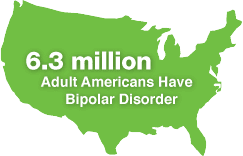By: Liz Wilson
A cursory look at the research demonstrates that there is still misinformation in the entertainment industry in regards to mental illness, too few role models who are public about their mental illness/es, and that measurable strides have been made by advocates and TV/Film personalities to change the old, stigmatized portrayals of people with Bipolar Disorder, et. al.
As a keen observer of how Hollywood views (and skews) the experience of those of us living with Bipolar Disorder, I ask you to look at the latest reporting of Mariah Carey “admit(ting)” she lives with Bipolar Disorder. At first, I am appalled by the use of the term “admits”, but as I read on, the article reveals that the actress was diagnosed in 2001 and—according to Ms. Carey herself—she remained in denial of her diagnosis until a recent hospitalization. Mariah’s story parallels other people living with Bipolar Disorder: it is not uncommon to resist diagnosis until a crisis—or several, across many years—ultimately causes a paradigm shift.
I attribute my initial skepticism to a lifetime of seeing the worst possible portrayals and references in TV/film when it came to symptoms of Bipolar Disorder. That is becoming less and less the case; Andre Lyons, the Empire character—son of Lucious and Cookie Lyons–, has included a storyline about living with Bipolar Disorder that is more accurate and more recurring. “He sees his doctor to tweak his meds on occasion and goes to work and functions and doesn’t fall apart when his baby dies,” according to a Social Worker interviewedabout the portrayal by VH1. The latest introduction of Andre’s grandmother, who also lives with Bipolar Disorder, is evoking a watch-and-see attitude among Hollywood insiders.
The wildly popular series, Shameless, chronicles the lives of five children abandoned by their Mother and Father. The Mother, notably, is in active addiction as well. Dual diagnosis of Bipolar Disorder and Substance Abuse Disorders are often co-occurring and messy to portray. Aside from a complicated portrayal of the mother, Shameless goes on, a few seasons in, to present one of her grown sons’ diagnosis with Bipolar Disorder as well. The storyline takes us along her son’s pilgrimage to/with his Mom while he is making sense of and accepting his diagnosis. The character’s colleagues and family most frequently serve as models of how to respond to an initial diagnosis.
Other TV/Film examples are cited in the aforementioned articles, but the bottom line is that Hollywood is responding to advocates like you and I who vocally challenge the extremes of behavior that have served as the norm until recent years. I maintain that it is a combination of our activism—a well meaning letter or phone call to the studio, writers, et. al to full-on awareness/destigmatization campaigns—combined with the disclosure of celebrities’ diagnoses with Bipolar Disorder that is changing the terrain for Hollywood writers.
I would be remiss not to take a minute to pay tribute to one of the pioneers in Anti-Stigma; Carrie Fisher (known for her portrayal of Princess Leia in Star Wars). Not only did Fisher publish multiple books and screenplays that helped observers understand mental illness better, Fisher spent the latter years of her life being out and loud as a person living with Bipolar Disorder. Without her work and ours, the atmosphere for Mariah Carey, Demi Lovato and others who have publicly disclosed their diagnoses in recent years would not have been possible.
Though there remains misinformation about Bipolar Disorder and mental illness in general, in TV/Film, we are turning a corner where more accurate information prevails (as complicated as that information sometimes is). I implore you all to educate yourself and disclose/educate others safely and accurately. For some of us it means telling a friend or loved one about our diagnosis, for others it involves writing letters/making calls before and after misinformation is aired, carrying a picket sign or contacting public or Hollywood Industry professionals to educate them. Whatever we are doing, it IS making a difference…kudos to us!


